|
|
|
Sort Order |
|
|
|
Items / Page
|
|
|
|
|
|
|
| Srl | Item |
| 1 |
ID:
193491
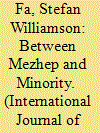

|
|
|
|
|
| Summary/Abstract |
Despite the growth in scholarship on diverse religious communities in Turkey, little attention has been paid to Twelver Shiʿi Muslims. Since the founding of the Republic, the Turkish state's foundational secularist agenda has attempted to control and promote a single hegemonic form of Islam, and Shiʿa have faced continuous issues practicing their faith in public as a result. While the liberalization of the past three decades has allowed Shiʿism to enter the public sphere, the community has had to continue navigating limitations on their expression of religious difference. Based on fieldwork in Eastern Anatolia, this article deepens understandings of Islam in Turkey by showing how Shiʿa have negotiated their position vis-à-vis both secularist and Sunni-majority actors and policies across various religious and political currents. Rejecting categorization as either mezhep (sect) or minority, Shiʿa have demanded independence from state religious control while also asserting their allegiance to the Republic and nation as Turkish Muslims.
|
|
|
|
|
|
|
|
|
|
|
|
|
|
|
|
| 2 |
ID:
133311
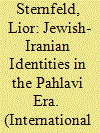

|
|
|
|
|
| Publication |
2014.
|
| Summary/Abstract |
A few years ago, while conducting archival research on Pahlavi-era Iranian newspapers, I came across a photo from the anti-shah demonstrations that took place in late 1978 and early 1979. It showed a large group of Armenians protesting against the shah. In these years many Iranians and Westerners considered the shah's policies beneficial for religious minorities in Iran. Around the same time, I found a sentence that made this discovery more intriguing. In his seminal work Iran between Two Revolutions, Ervand Abrahamian mentions that throughout the Muhammad Riza Pahlavi era, the opposition to the communist Tudeh party accused it of being controlled by "Armenians, Jews, and Caucasian émigrés." I tried to find references in the current scholarship to Jews participating in the party, which could have earned them their part in this propaganda campaign, but found very little. Having read the important works of Joel Beinin, Orit Bashkin, and Rami Ginat on Jewish revolutionaries, including communists, in the Middle East, I wondered where the Jewish radicals in Iran were. Several factors may contribute to this silence in the historiography: the writing of Iranian history from a Zionist vantage point, a lack of interest in the history of the Iranian left in the postrevolutionary historiography, and an inability to conceptualize the transregional and global nature of the Iranian Jewish community.
|
|
|
|
|
|
|
|
|
|
|
|
|
|
|
|
| 3 |
ID:
137384
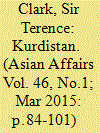

|
|
|
|
|
| Summary/Abstract |
This article offers a historical overview of the situation of the Kurds and Kurdistan from antiquity to the present day. It then describes the travels of the author, who was the British Ambassador to Iraq from 1985 to 1989, around the Kurdish region, with a wealth of social, cultural, and political observation. Of particular note are the author's observations on the period of Saddam Hussein's chemical attacks on the Kurdish region during the 1980s. There are also descriptions of encounters with the region's religious minorities, and also Kurdistan's architectural heritage. The author concludes with a discussion about the future prospects for the autonomy and independence of the region.
|
|
|
|
|
|
|
|
|
|
|
|
|
|
|
|
| 4 |
ID:
122381
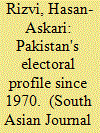

|
|
|
| 5 |
ID:
111195
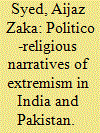

|
|
|
| 6 |
ID:
165300
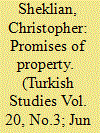

|
|
|
|
|
| Summary/Abstract |
The policies of the Turkish Justice and Development Party (AKP) towards religious minorities exhibits a fundamental ambiguity. Though the AKP has supported a number of high-profile changes in policy towards Armenians and other non-Muslim minorities, the party has left the underlying legal structure intact. This article describes developments in the treatment of non-Muslim vakıfs (often translated at ‘religious foundations’) under the AKP, specifically the restoration of the Holy Cross Armenian Cathedral on the island of Akdamar and the reopening of the Surp Giragos Armenian Church in Diyarbakır. Using these examples, the article demonstrates how the tension between changing policy and enduring legal structure points to an ‘ambiguous attitude’ on the part of the AKP towards Turkey’s religious minority populations.
|
|
|
|
|
|
|
|
|
|
|
|
|
|
|
|
| 7 |
ID:
166659
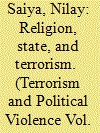

|
|
|
|
|
| Summary/Abstract |
This article investigates two ways in which state involvement in religion—minority and majority restriction—generates terrorism. Using a time-series, cross-national negative binomial analysis of 174 countries from 1991–2009, this study finds that when religiously devout people find themselves marginalized through either form of religious restriction, they are more likely to pursue their aims through violence. The article concludes with recommendations for policymakers.
|
|
|
|
|
|
|
|
|
|
|
|
|
|
|
|
| 8 |
ID:
145089
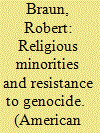

|
|
|
|
|
| Summary/Abstract |
This article hypothesizes that minority groups are more likely to protect persecuted groups during episodes of mass killing. The author builds a geocoded dataset of Jewish evasion and church communities in the Netherlands during the Holocaust to test this hypothesis. Spatial regression models of 93 percent of all Dutch Jews demonstrate a robust and positive correlation between the proximity to minority churches and evasion. While proximity to Catholic churches increased evasion in dominantly Protestant regions, proximity to Protestant churches had the same effect in Catholic parts of the country. Municipality level fixed effects and the concentric dispersion of Catholicism from missionary hotbed Delft are exploited to disentangle the effect of religious minority groups from local level tolerance and other omitted variables. This suggests that it is the local configuration of civil society that produces collective networks of assistance to threatened neighbors.
|
|
|
|
|
|
|
|
|
|
|
|
|
|
|
|
| 9 |
ID:
081176
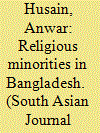

|
|
|
| 10 |
ID:
170472
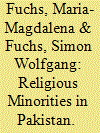

|
|
|
|
|
| Summary/Abstract |
This introduction to the special section of South Asia: Journal of South Asian Studies, titled ‘Religious Minorities in Pakistan’, reviews the existing scholarship on this topic, points out gaps in the research, and discusses problematic notions and assumptions in both popular and academic discourses on minorities. Furthermore, it attempts a definition of the term ‘religious minority’, demonstrates its extensive entanglement with the question of caste—a characteristic specific to the South Asian case—and situates this discourse within broader debates about post-colonial state-building, the history of sectarianism in the region, contestations over religious authority, and the striving for a coherent political and cultural identity in Pakistan, the second-largest Muslim nation in the world.
|
|
|
|
|
|
|
|
|
|
|
|
|
|
|
|
| 11 |
ID:
081175
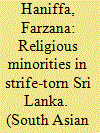

|
|
|
| 12 |
ID:
184161


|
|
|
|
|
| Summary/Abstract |
This article undertakes a comparison between Safavid Iran and modern Pakistan with the aim of highlighting the similarities and differences between their respective state projects of crafting ‘Islamic’ polities. The comparison proceeds through a focus on the state-sanctioned practice of ritual cursing of Sunnis and Ahmadis in Safavid Iran and Pakistan respectively. In both cases, the states made extensive legal efforts to mark out these religious Others by vilifying them on charges of heresy and innovation. This article argues that this vilification was oriented towards creating homogeneity among political subjects of the polity, who were required by the state to curse and condemn these religious Others in order to demonstrate their submission to sovereign power. Ritual cursing thus functioned as an oath of submission that was elicited by the state to draw subjects into the project of sacralizing the polity and to discipline them into reproducing the normative order of the sovereign power. There are also significant differences between the two cases that throw light on the historical specificity of different modes of sovereignty in early modern and modern Muslim polities. While Safavid kings sacralized their realm through the diffusion of scriptural law moulded to enhance their own sovereign power, the Pakistani state is engaged in the sacralization of the national body politic through its official religious nationalist ideology.
|
|
|
|
|
|
|
|
|
|
|
|
|
|
|
|
| 13 |
ID:
124497
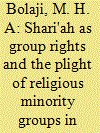

|
|
|
|
|
| Publication |
2013.
|
| Summary/Abstract |
This article investigates how Shari'ah penal codes, as group-differentiated rights, jeopardize the rights of minority groups in northern Nigeria. The first section explores the concepts of individual and group rights in legal discourse. This is followed by an account of Shari'ah penal codes in northern Nigeria. Then, it examines the political expression of collective identity as group-differentiated rights, and how this expression of collective identity through Shari'ah law has endangered the rights of the members of minority religious groups in northern Nigeria. The paper concludes that, to address the emerging dysfunctional dimensions of Shari'ah, government must work with Islamic civil organizations so as to emphasize the welfare aspects of Shari'ah, and liaise with reputable northern Nigerians to appeal to the members of the Boko Haram to lay down their arms.
|
|
|
|
|
|
|
|
|
|
|
|
|
|
|
|
| 14 |
ID:
156808
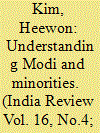

|
|
|
|
|
| Summary/Abstract |
In the May 2014 general elections in India, the Bharatiya Janata Party (BJP) emerged as the majority party. The BJP has formed a coalition with regional parties (the National Democratic Alliance), but many view the event as a “critical election,” presaging the realignment of Indian politics along Hindu nationalist values. This article reviews the approaches used to understand the BJP-led NDA government’s policies toward religious minorities and argues that far from marking a radical departure, there are more continuities than discontinuities in these policies with previous administrations.
|
|
|
|
|
|
|
|
|
|
|
|
|
|
|
|
| 15 |
ID:
096883
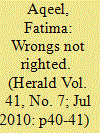

|
|
|
|
|
|
|
|